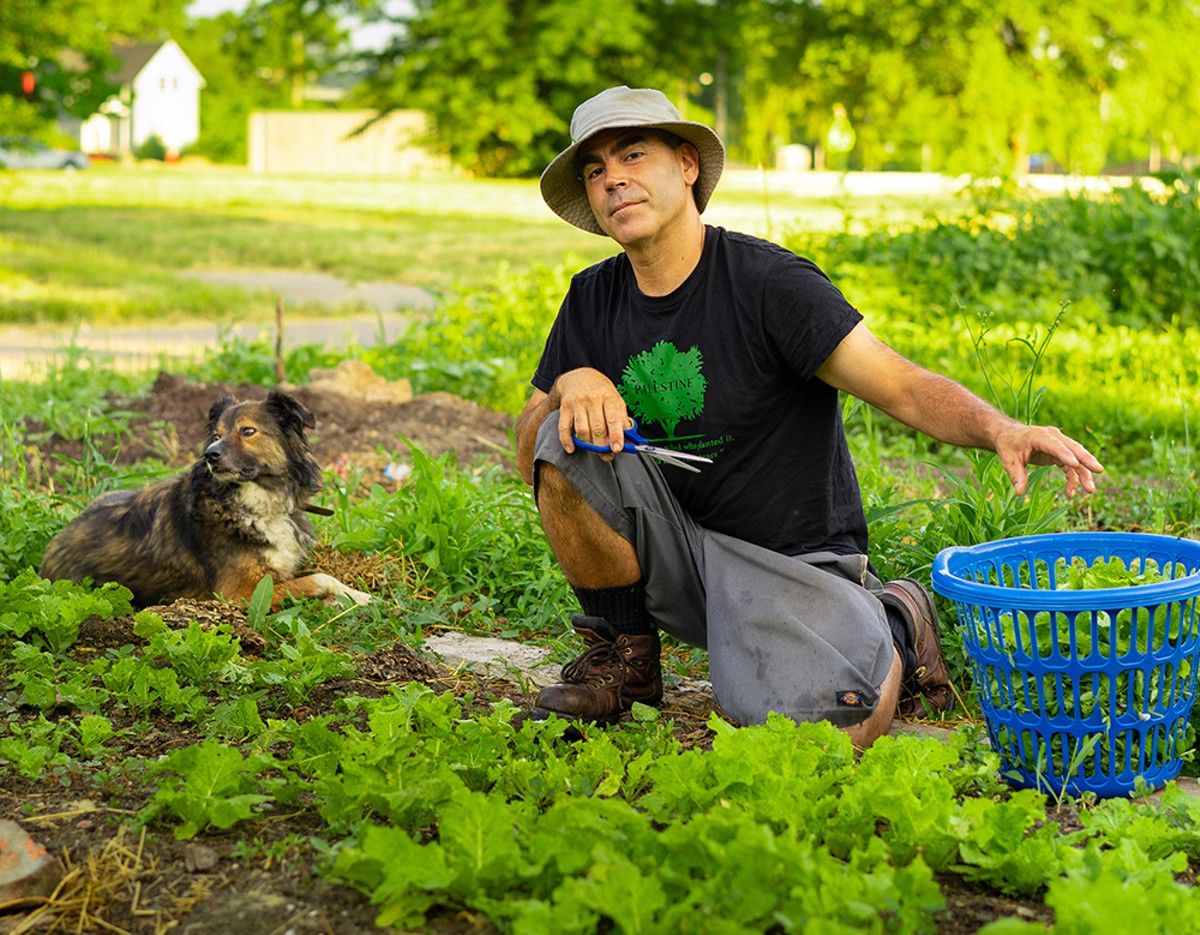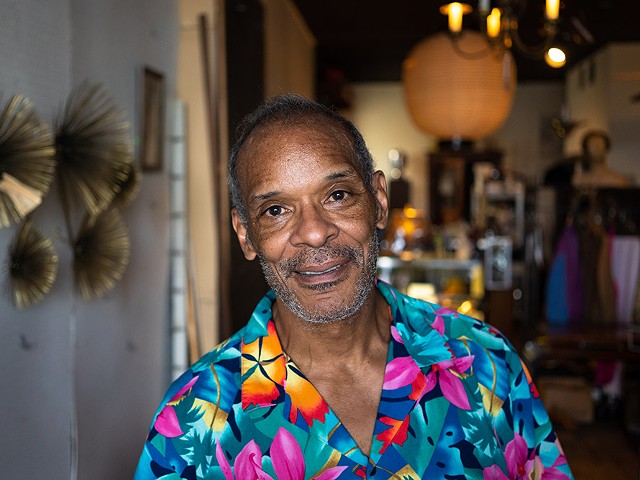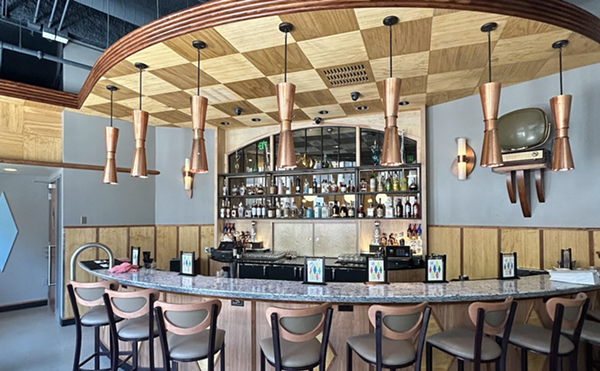As the founder of a salad farm, 49-year-old Greg Willerer has found a measure of success in growing greens. Having grown up in suburban Detroit, he was drawn to the city early, and spent 15 years as a teacher, most of them in Detroit, before "teaching to the test" and the push to produce numbers were enough.
"In 2009, I quit," he says. "And with Grown in Detroit I was making a decent amount of money just in the summer selling produce while I was still teaching, so I decided to see how much I could do by myself. I had my house all bought and paid for with cash made while I was teaching. My truck was paid off, so I just thought I would cut my bills, just manage things a little smarter, and see how much I could make from farming."
A couple years later, he met his wife, Olivia Hubert, a born-and-bred Detroiter who teased him about 'being a fool with the farm.' Willerer happily grants her that privilege, as she's a classically trained horticulturalist who went to Michigan State University and knows much more than he does about agriculture.
These days, the two are busy raising their 4-year-old daughter and building their operation, which has grown into a compound comprising the entire block, from Vermont to Rosa Parks and from Elm to Temple. They own five parcels and farm another nine that they hope to buy. It hosts at least two-dozen other creatures, including two dogs, three chickens, eight geese, and two braces of ducks. And yet you'd hardly guess there were animals by the smell — the breeze on our afternoon visit bears a sweetness that likely comes from the hay they've laid down by the duck pond.
"The hay sprouts," Willerer says, "and the chickens and ducks will eat it. There's a lot of bonuses for them: They get a lot of forage, they get a lot of snacks, even our household waste. Whenever we have cantaloupe and throw them the rinds, it's just a frenzy."
In the summertime, they don't really buy any vegetables. Sometimes they might buy something at Eastern Market that they don't grow, like celery, or delicacies the farm doesn't produce, like hormone-free red meat or mushrooms. But, for the most part, from interaction with the earth or the community around them, they have much more agency in their lives than the typical Detroiter. The land feeds them, and they feed the land. Their back-to-basics lifestyle includes homemade soap and their 100,000-BTU wood-burning hot water boiler. Out back is a cabin, smaller than 100 square feet, with old doors used as wainscoting to give it a homey feel.
Out past Richmond in New Haven, they even have some more land. "We can't really grow enough to sell to all these restaurants," Willerer says, "so in the past we've been growing out there as well as down here." Other long-term plans for that land might include raising catfish in a series of ponds.
Willerer began building up the farm with compost, which it still produces. "A lot of the time we take huge amounts of leaves and are constantly turning them, moving them around with the tractor." Olivia jokes about the farm being a "great material continuum at work," and that they're the sort of couple likely to head into demolition zones with their his-and-hers chainsaws in search of more material to burn or compost.
How is a small-scale farm able to compete with the corporate-sized food suppliers? One reason is the modest scale of city eateries. "These restaurants have small coolers," Willerer says. "If a restaurant were going to use a larger supplier, they would lose money, but we're able to make more than one delivery a week."
What's more, the greens are fresher that way. "That's why we have a cult-like following at the market and help other restaurants to get their cult-like following," Willerer says. "Brother Nature will harvest in the morning and deliver pounds of fresh produce to a restaurant. ... How many restaurants serve a salad that was picked that morning? One that is actually five hours old?"
He says they sell between 200 and 300 pounds of salad a week, but the demand keeps growing.
"Farming in general is hard," Willerer says, "but farming on an acre when you're trying to supply people at Eastern Market, at the Wayne State Market, and a lot of restaurants... We want to get bigger and bigger every year. This is the first year we've kind of shrunk down our numbers as far as how many pounds of salad we're producing. It's been a rough year too, because it's been so frozen."
Of course, Willerer and his family are cultivating more than lettuce.
"If something happens, the police aren't going to come until maybe 45 minutes later," he says. "They're good people, but they've got enough to do, so we are vigilant. For the most part, we haven't had a lot of crime on this block because a lot of the times we're up early in the morning. Sometimes I'm up watering at night. We've got these high-powered flashlights where if we see somebody, like, having sex in their car or something, we chase them off. And when you do that, when you're vigilant, the people who are going to peck at the outside of what you own are going to go somewhere else to steal something."
Willerer makes an effort to work together with his neighbors to earn their blessings, and engages in projects that help them, whether it's using the tractor to unearth the neighborhood's overgrown sidewalks, running a just-in-time snow removal service, or assisting with agricultural efforts at farmscaping, rewilding, and creating homes for pollinators.
"In a way," Willerer says, "it's kind of like a village lifestyle in America in the 21st century, because, really, it is kind of like a village here. People depend on each other in a village, and you try to buy as local as possible and support everyone in your village. And, yes, you do have to go into town every once in a while — which would be like we have to go to Target or something — but for the most part we try to live like we're in a village."
From our 2018 People Issue.
Next: The Mediator.
Previous: The Facilitator.
Stay on top of Detroit news and views. Sign up for our weekly issue newsletter delivered each Wednesday.






